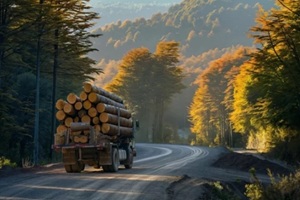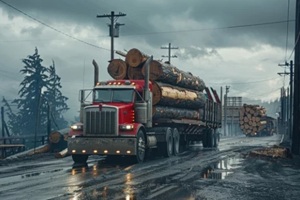
America runs on truckers, the workforce transporting essential products across the United States to a consumer’s final destination. Whether the cargo is pharmaceuticals, food products, furniture, or something else, a trucker’s job is important for many people’s daily lives.
Log truckers, in particular, serve as one of the first steps in a tree’s journey from growth to processing into some of the most essential everyday items humans use. This is why log truck insurance is so important!
Without logging truck insurance, the companies operating the trucks face significant financial risk, not just from the timber’s loss but also from delays and reputational harm if they cannot fulfill the promised timelines.
In addition to the many risks faced by all log trucks for which insurance is essential, some companies will need to invest in even more protection based on where their trucking takes them. Here is how to customize log truck insurance for multi-state operations.
What Does Log Truck Insurance Cover?
Log trucks face numerous risks while traveling from the timber harvest location to the drop-off point. Because many of these risks are the same regardless of trucking location, log truck insurance offers many standard protections no matter the policy. These typically include:
- Liability insurance – A log truck can be a dangerous vehicle, given its size and weight and the cargo it is hauling. If the truck causes damage to someone else’s vehicle or property (e.g., during an accident, if timber comes loose, etc.), the log truck insurance policy should cover the cost of those losses, compensating the other party. The same is true of bodily injury caused by the log truck.
Physical damage insurance – Because log trucks are exposed to such risky terrain, narrow roads, and other hazards, it is not uncommon for them to sustain damage along the way. Log truck insurance usually covers physical damage to the truck so that repairs do not delay the trucker’s timeline.
Cargo insurance – The timber the log truck is hauling is valuable. If something were to happen to it, the trucking company would face significant losses not just from the value of the timber but also from reputational damage, as they were not able to supply the timber as promised. Cargo insurance can help to cover these various financial impacts.
How Multi-State Operations Change Trucking Insurance Needs
Many trucks transport timber from stands to its final destination within one state, called intrastate trucking. However, some logging companies rely on timber transported from distant places, and such log trucks will need to cross state lines. This is called multi-state trucking or interstate trucking. Log trucks that engage in interstate trucking, even if only rarely, must adjust their insurance holdings to make sure they comply with interstate travel requirements.
Some considerations for customizing log truck insurance for multi-state operations include:
Liability Limits
While interstate and intrastate trucking companies require liability insurance, the minimum coverage may differ depending on how far the truck travels. Multi-state operations often require greater minimum protection for log truck liability to compensate for the various requirements of each state through which the truck might pass.
Changes to Cargo Protection
Cargo protection also often changes based on multi-state operations. Basic cargo insurance may offer protection for intrastate or some limited interstate travel. Still, inland marine insurance broadens this coverage to include multiple property types, including equipment traveling with the timber. Many multi-state logging companies choose to use both.
State Versus Federal Requirements

When a log truck passes through multiple states, it is beholden to the insurance requirements of each state whose border it crosses. Interstate log trucks must abide by federal guidelines to simplify getting insurance for this situation. These requirements make it easier for trucks to comply with multiple state-differentiated requirements.
For instance, federal insurance guidelines may mandate a higher liability insurance minimum or a specific blend of policies that form the baseline of any insurance strategy. Coupled with customized guidance from industry professionals, log truck operations can remain compliant and protect their bottom lines.
Get Complete Insurance Coverage for Your Multi-State Travels
Transporting timber from state to state is a significant responsibility; with it comes significant risk. It is smart to partner with industry professionals knowledgeable about the risks specific to log trucks that travel interstate to minimize the financial consequences of unforeseen events on the road.
The team at Burton & Company can help you create a mixture of insurance coverage that addresses your needs and remains compliant with every state through which you travel. Contact Burton & Company today for a customized recommendation.

